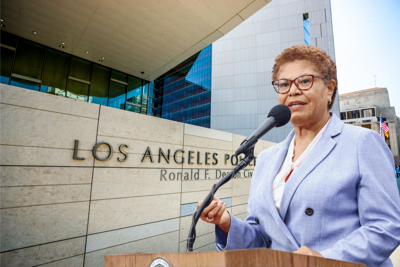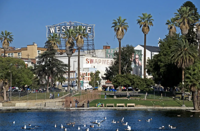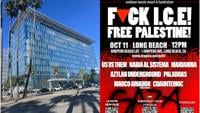The search for a new LAPD chief could soon be finalized. The multi-billion-dollar agency and one of the United States’ largest police forces will be led and represented by a new leader, leaving many wondering if a Latino or Latina could rise to the LAPD’s top-ranking position.
The city’s police force, which in the last year faced the lowest officer levels in decades, is currently in the process of conducting and finalizing interviews with the last candidates for the new police chief, a job that can last five to ten years.
The number of candidates has been narrowed down to three from the 10 top contenders that were being considered last month, the Los Angeles Times reported after receiving over 30 applications for the position. Two out of the 10 finalists are Latinos and one is a Latina. The names of the final three candidates have not yet been disclosed.
The 10 initial candidates, according to the Times sources, include Jim McDonnell, a one-time LAPD assistant chief and former Los Angeles County Sheriff; Assistant Chief Blake Chow, who oversees LAPD special operations; Deputy Chief Emada Tingirides, commanding officer of the department’s South Bureau; Deputy Chief Donald Graham, who heads the Transit Services Bureau; Deputy Chief Alan Hamilton, head of the Detective Bureau; Commanding Officer Lillian Carranza of the Central Bureau; former Houston and Miami chief of police Art Acevedo; and Robert Arcos, a former LAPD assistant chief who works for the Los Angeles County district attorney’s office. The Times reported two additional unidentified women policing executives from outside agencies who have received second interviews.
In a place where L.A.’s diverse population is made up of approximately 50% Latinos, many question if Mayor Karen Bass could make history by appointing the first Latino for the job. According to the latest data, LAPD is also comprised of a diverse sworn workforce, with 53% of sworn officers identifying as Hispanic.
The months-long race began after former Chief Michel Moore retired, appointing Dominic Choi, one of his former assistant chiefs, as interim leader. "It has been an honor and privilege to have served Los Angeles for more than four decades,” Moore said in a statement in February. “As I look forward to my next adventure with my family, I am proud of the dedication of our people and know the future for Los Angeles and the LAPD is bright."
The process of electing a new chief
Appointing a new chief has layers of steps, which, in many cases, can take several months. The recruitment and selection process for qualified candidates for the position is administered by the general manager of the Los Angeles Personnel Department in cooperation with the Board of Police Commissioners, made up of five civilian members who function as a corporate board of directors, setting policies and overseeing LAPD’s operations.
Earlier this year, the city also paid $65,000 to the firm Bob Murray & Associates to help identify and list 10 to 20 candidates for the job.
The general manager of the Personnel Department, who in this case is Dana H. Brown, is tasked with referring a group of at least six highly qualified candidates to the commissioners.
The next step to narrow down the search comes when the commissioners provide Bass with an additional list of three candidates, in ranked order, from the group of candidates previously provided by the general manager of the Personnel Department. Bass will then select and appoint one of the three candidates, who will be subject to confirmation by members of the L.A. City Council.
However, according to the L.A. Charter and Administrative Code, if the city council fails to confirm the mayor’s appointee for police chief and if any additional candidates remain, the mayor can request and receive an additional candidate from the Board of Police Commissioners. The mayor may then appoint that candidate or one of the candidates on previous lists provided to her and await council approval and confirmation.
The Chief of Police has a five-year term with the possibility of running for a second (five-year) term.
LAPD Chief Latino candidates
“For many people, having [a] chief is important in a number of ways—for people being validated, acknowledged [and] that they have somebody that looks like them, that knows their culture, their history, their traditions and all of the things that come with being Latino,” Arcos, one of the Latino candidates, told CALÒ News. “It’s meaningful and it inspires people.”
Arcos, who currently serves as the Chief of the Bureau of Investigation (BOI), L.A. County’s fourth largest law enforcement agency, responsible for investigating public corruption, fraud, cyber security, officer-involved shootings and child abduction, said he also applied for the chief position in 2018.
Although Arcos, who was born in San Antonio, Texas, was called an outsider by a recent L.A. Times story, he said his time with the BOI gave him a particular experience as did his time living in L.A.
“I moved to L.A. when I was eight years old,” he said. “I was raised on these streets. I was raised in these communities. I was raised in these schools and as a kid, I played at these parks, as in L.A. I have a very close connection to our city.”
With more than 30 years of policing experience, Arcos first graduated from LAUSD’s John Marshall High School. He then enlisted in the United States Army, where he served for four years. He was later appointed to the LAPD in 1988, rising through the ranks of the department. In 2021, he joined the L.A. County’s district attorney’s office as Chief of Bureau of Investigation.
“It has been the honor of a lifetime to be a Los Angeles police officer and to serve this city and this department and all of the things that have happened in the last 30-plus years,” Arcos said.
Although the department has not had a Latino police chief, Arcos said the department's diversity has grown since he first joined. “When I started in the department in 1988, there were not a lot of people who looked like me or had a similar story,” he said. “It's taken so long for us to prepare ourselves and for Latinos to be represented in this city that is already predominantly Latino.”
Carranza, who is also one of the candidates for the job, has been working at LAPD for 33 years. She was born the first of three children in Honduras, Central America and grew up in New Orleans, Lousiana. She moved to Southern California in 1988 and joined the LAPD in 1989.
Carranza serves as the Assistant Commanding Officer of Operations-Central Bureau (OCB). In this capacity, Commander Carranza helps to oversee the OCB Homicide Unit, Central, Hollenbeck, Rampart, Newton and Northeast Areas. Operations-Central Bureau provides service to a diverse residential population of nearly 800,000 residents within its 64 square miles.
Earlier this month, the police union Los Angeles Police Protective League filed a lawsuit against Carranza, accusing her of unlawful computer data access and fraud. CALÓ News reached out to Carranza via email but received no response.
The third Latino who is also being considered for LAPD chief is Acevedo, who was born in Cuba. He was four years old when he immigrated to the United States with his family in 1968.
Acevedo left Houston to become the police chief in Miami, Florida, where he was fired after six months on the job. Houston Public Media reported that Commissioner Joe Carollo questioned an older photo where the police chief was seen using a "white power" hand gesture similar to the OK hand sign, saying a Miami officer was relieved of duty by Acevedo after being accused of using the same gesture.
CALÓ News reached out to Acevedo through his consulting firm via email but received no response at the time of publication.
History of LAPD Chiefs
The past history of LAPD chiefs has not always been bright, leaving many disappointed.
The chief of the department, which has a longstanding history of scandals ranging from the use of excessive force to having gangs within the department, will be leading efforts to alleviate the distrust among many communities.
Daryl Gates, LAPD chief from 1978 to 1992, was largely criticized for enforcing police brutality and abuse of power, according to The Nation. Before the 1984 Olympic Games, Mayor Tom Bradley, who was the first Black mayor of Los Angeles, empowered Gates to take all of the city's gang members into custody, where they remained until shortly after the Games' conclusion. Even after the games, Gates, Bradley and city council officials found a way to continue the sweeping policies to jail predominantly Black and Latino youth, who were ultimately never charged. From 1984 through 1989, there was a 33% spike in citizen complaints against police brutality.
Willie Williams was chief from 1992 to 1997. He faced the task of restoring confidence in the department after Gates and the 1992 Los Angeles Riots. His contract was not renewed after he was seen as failing to create meaningful changes in the department.
Bernard Parks, chief from 1997 to 2002, faced corruption charges and more police brutality in the elite C.R.A.S.H. anti-gang unit of the Rampart Division in the overwhelmingly Latino Pico-Union and Westlake districts.
William Bratton, chief from 2002 to 2009, was a key proponent of “broken windows” theory of policing, which he described as “a highly discretionary police activity that requires careful training, guidelines, and supervision, as well as an ongoing dialogue with neighborhoods and communities to ensure that it is properly conducted.”
Charles Beck, from 2009 to 2018, is known for commanding and rehabilitating the Rampart Division after the Rampart scandal. During the 2013 manhunt for Christopher Dorner, eight Los Angeles police officers fired 103 rounds at two innocent women who were delivering newspapers. Beck chose to allow the shooting officers to return to duty after undergoing additional training, saying the shooting was “a tragic misinterpretation.”
Michel Moore, chief from 2018 to 2024, said after the George Floyd protests in Los Angeles that people were not "mourning the death of this man, George Floyd—we had people capitalizing. His death is in their hands as much as it is those officers." This led to citizens' reactions at the Police Commission meeting, where Moore sat for nine hours in silence while citizens asked for his resignation, the Los Angeles Times reported.
“LAPD chief is a tremendous responsibility and obligation to fulfill,” Arcos said. “The polarization right now in our country has never been so pronounced. That brings a number of things to the city. As police chief, you have to deal with public safety and community engagement. Those things are a given; you always have to be challenged by that but I think all the other external factors that are going on right now create another level of concern that you have to really be prepared for, and I am.”
Mayor Bass’s communications team said they had no comment about the selection of the LAPD Chief.
An official hire for the next LAPD chief is expected to be announced in the next few weeks.











(0) comments
Welcome to the discussion.
Log In
Keep it Clean. Please avoid obscene, vulgar, lewd, racist or sexually-oriented language.
PLEASE TURN OFF YOUR CAPS LOCK.
Don't Threaten. Threats of harming another person will not be tolerated.
Be Truthful. Don't knowingly lie about anyone or anything.
Be Nice. No racism, sexism or any sort of -ism that is degrading to another person.
Be Proactive. Use the 'Report' link on each comment to let us know of abusive posts.
Share with Us. We'd love to hear eyewitness accounts, the history behind an article.